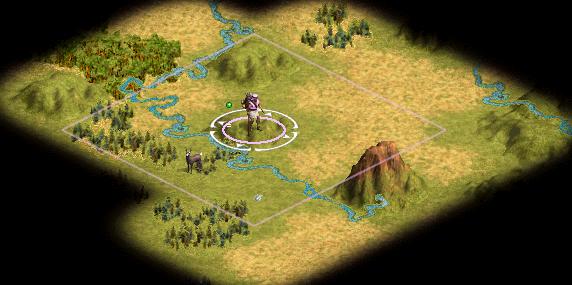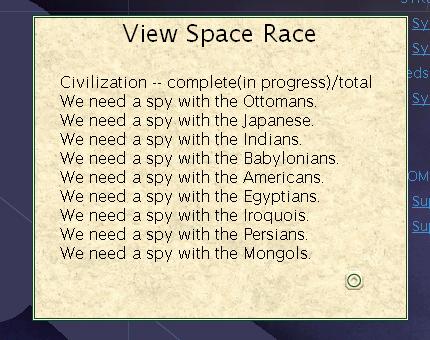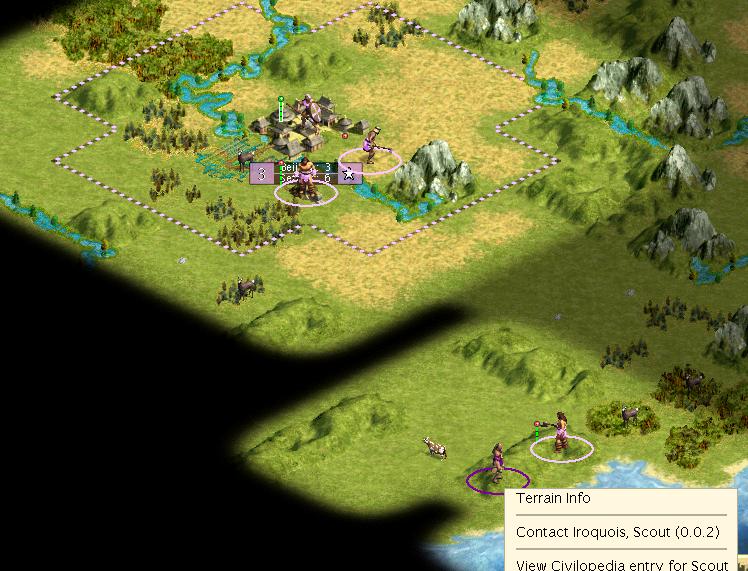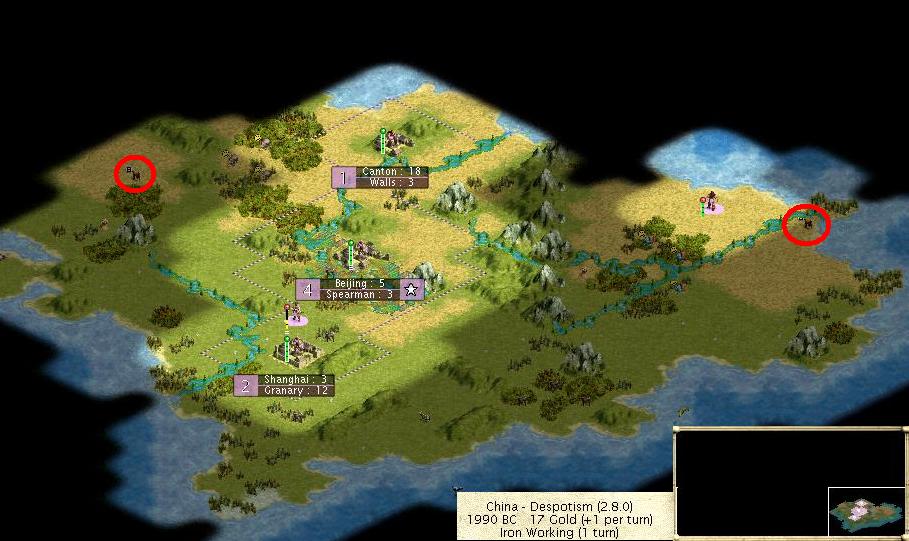

I came into this game eagerly, having been away from Civ3 for awhile and hungry for some renewed action. I had been trying to learn how to play Master of Orion 3, and while the game does have potential, at the time of this writing the game is so badly unbalanced and missing so many important features that it's simply not that much fun to play. Going back to Civ3 for a short time to work out some of my frustrations was a good idea. And Always War is the type of variant which demands total attention; either it will absorb your interest completely and suck away all of your free time trying to eek out a win, or it will chew you up and spit you back out before the game really gets going. There is no in between; victory or death are the only options in this variant. At some point in time you either pass the critical threshhold needed to keep advancing forward, or you fail to do so and it becomes only a matter of time until the AI civs crush you mercilessly. That probably sounds depressing, but in reality this type of game is a lot of fun to play - if incredibly time-consuming.
The civ choice was China, the civ that I had theorized in the past would be the ideal choice for an Always War situation, for several reasons. First, the Chinese have the (IMO) ideal combination of civ traits for an Always War variant. Their Militaristic trait provides more promotions (which allows the chance for more leaders) and just as importantly shield discounts on very crucial buildings for this scenario: barracks, city walls, harbors, and airports. This combines excellently with the Industrious trait, since in Always War games you don't really have the time to produce as many workers. Anyone who's played this type of game also knows that workers are absolutely critical in military operations to lay down roads and rails for your forces to advance through hostile territory. Not only do the Chinese have wonderful civ traits for Always War, they have one of the best unique units in the Rider; the value of having a three-move knight cannot be overstated. Riders can capture cities much more easily than knights with their increased movement, can cover more of your own territory when playing "zone defense" against enemy incursions (this happens all the time in Always War games), and provide a perfectly timed Golden Age for your civ to boot. What's not to like about China? They don't get any cultural building shield discounts, of course, but that's hardly a big priority in this type of game. :) With that in mind, let's take a look at the game's starting position:

That's a pretty good location; on a river, on a hill, several bonus grasslands, and with a game time in range. This was the picture provided before the game started, and I guess maybe the pic and the fact that this game was "only" on Monarch difficulty led some people to believe that this game was too easy. Several folks rather good-naturedly asked for an Emperor Always War game, since the last Monarch AW game had been so easy. Sirian, the map's designer, hinted pretty strongly to play this one out, and that it wouldn't be as easy as the last one. Since this was a customized map, I knew that there was some kind of a trick up Sirian's sleeve that he wasn't telling us about; maybe we would be missing a key resource, or the land around that start was terrible, or something. The first thing that I did when I started the game was to open up the F10 spaceship screen to see who my rivals would be in the game. Look what I saw:

Aha! So there's the catch. We would be playing against not seven but NINE opponents on a standard sized map. This would be quite a bit more dangerous, since each civ would experience less overall corruption than if we were to play against seven larger AI opponents. Not to mention that we would have to deal with even more different UUs and AI tech trading with one another. But bring it on! I was ready to take on all comers.
My early game was conservative, to say the least. The last thing I wanted was for some random AI civ to walk right into an undefended city early on and cripple my civ's expansion. So I played everything very close to the vest, taking no chances whatsoever, and thus expanding much slower than my usual "walk right in and rape me" farmer's gambit pace. I founded on the starting tile, since it was in a good location (and on a hill, should the worst come.) I began researching Bronze Working at max rate (not Pottery as usual) in case I should need spears early on. The first build was a warrior, to explore and defend. My worker went right away to chop down the game forest.
The first warrior completed in 3800BC, and I next set Beijing to build a barracks to take advantage of the shield bonus from clearing the forest. The barracks completed in 3550BC, and then two more warriors were dialed up. I then started prebuilding for a spear with an archer, and when Bronze Working was completed in 3200BC, I switched over to one. Research was then started on The Wheel, so that I could find and claim horses before it was too late (no horses or iron = extremely bad in Always War). I should mention that my experiences here were rather clouded by my one previous stint of AW in Epic14. In that game, we had started right on top of several AI civs, with the Americans no more than 7 or 8 tiles away from the player starting point. In that game I wasted a lot of shields by building a granary in the capital, and ran out of room to expand after founding 4 cities. Furthermore, I rushed the Pyramids before 1000BC, so my build of a granary had been a waste. Based on this thinking, I had decided not to build a granary in my capital for this game. That proved to be a strategic mistake, but I could not have known that at the time. I was simply being conservative, in the event that I had started right next to an AI civ (which, as the case turned out, I was not). Regardless, I was not unhappy with the way I played out the opening to my game; better safe than sorry, after all.
I first contacted another civ in 3150BC, and it was the Iroquois! One of their scouts was foolish enough to wander into the region around my capital. This means war!

But before I declared war on his puny civilization, I made a couple of trades: Masonry and Warrior Code for Ceremonial Burial, Pottery, and 10g. Yes, I got ripped off there, but in an AW game you only get once chance to trade with each civ, so better make the most of it! Then it was time to declare war, and so on the 17th turn of the game I was already at war for all time to come. You can also see from this picture that I was exploring in a circular pattern around my capital, not wanting to expose too much land at once and meet more opponents. I discovered around 3000BC that there was an ocean to the east, and the fact that I had not met any opponents yet from that direction indicated that I was safe that way. With seas also to my south, it appeared that the enemies would be coming at me from the north and the west. This was good, as having to defend only two directions would make this game a lot easier.
Beijing built its first settler (sans a granary) in 2850BC and Shanghai was founded in 2670BC. It was located next to another game tile, and I intended to use this second city as a settler factory, starting it right away on a granary. Note the reversal of roles from the usual, where the capital is the settler factory and the second city produces military. I was playing this one as safe as can be early on, to avoid the chance of a streak of bad luck ending my game entirely. The Wheel was discovered in 2550BC, and I spotted horses to the northwest. They were out in a highly exposed region, and would be difficult to connect to my cities; I made getting them a top, but long-range, priority. By 2430BC I had yet to spot any enemies, and was getting nervous as a result. It was about this time that I realized I should have built a granary in the capital first, but it was easy to say that in retrospect. I had not expected to be this isolated, given the pangea setting for the game. Players who gambled more will have the chance to finish faster; that's always been the nature of strategy games. And I'm just not a gambler. :)
Three Iroquois warriors showed up in 2350BC near Shanghai, prompting that city to switch to walls for safety. In the resulting sequence, the Iroquois managed to pillage my road to Shanghai but were unable to take the city; an archer finished off the last one in 2230BC. That was the best chance the Iroquois had to take one of my core cities, two regular warriors against a vet spear behind walls. Things would steadily improve for me from this point onward. I founded Canton as my third city in 2070BC (so slow!) and thus created my first defensive line. There would be many more throughout the game. Here's a picture of the original Canton-Beijing-Shanghai line:

This picture clearly shows the territory I would be trying to defend for most of the game. The player has a fairly defensible position, with one real front in the northwest, and plenty of room to fill in backland cities behind the defensive lines. The closest horse resources are not very accesible, however, with one far exposed out where the front would soon form and another far to the east, if in safer territory. It would be a long time before I could hook either of them up. You also might want to note how every city has built or is building city walls; I put the things in literally every city and never regretted it one bit. At only 10 shields, you'd have to be crazy not to build the things everywhere in an Always War context.
The next Iroquois threat appeared in 1575BC, consisting of two warriors and an archer. I beat them off with a loss of only one spear, a clear victory for me. Expansion remained extremely slow, with my fourth city of Nanking only getting founded in 1375BC (ouch!) But by this time I had gotten all my cities secure, and Shanghai had finished a granary to allow for much more rapid expansion thereafter. By 1250BC, my situation was looking much better than before; still rather slow on expanding, but a definite line of cities had been created with strong defenses around them:
This image has been lost.
Tsingtao has pushed my lines forward a bit, and now the defensive line stretches from Canton to Beijing to Tsingtao. Nanking and Shanghai are now safe from attack, and I would be pushing foward to put another city northwest of Beijing to grab the ivory deposits there soon. Also notice the Iroquois border peeking out from under the fog in the west; they really aren't that far away at all!
Shortly after taking this picture, I was rudely introduced to the rest of the world. Writing must have been discovered and traded around, because in 1175BC I suddenly had contact with the Americans. Abe had other communications, but fortunately I didn't have to trade for them. With no deals possible, I was forced to declare war on his sorry civilization. In 1075BC, I went from a quiet front to major danger instantly, as two Mounted Warriors appeared out of the fog. Mounted Warriors! Uh-oh, I don't have any unit better than archers/spears, since I had yet to connect any resources to my civ. Could... get... ugly. I managed to beat off that assault at the cost of only an archer, but I would be in dire straits if the attacks continued. But the Iroquois suddenly stopped sending their fearful super-horsemen at me, in one case two of them that I could see actually turned around and headed back the other direction. What was going on? Were the Iroquois at war with someone else? I had no way to find out until the postgame replay, but whatever the case, I was glad for the respite.
Beijing hit size 7 and the magical 10 shields/turn threshhold in 1050BC, greatly speeding up my production of units. And on the next turn I suddenly had contact with Persia and the Ottomans - this new feature of PTW certainly makes Always War more harrowing! The only possible deal was to exchange my world map for Xerxes' territory map; a rip-off, to be sure, but I wanted to get at least a little map information out of them. With nothing else possible, I declared war on both. The very next turn I had contact with Egypt as well! What was this, some kind of AI get-to-know-you convention? With again no deals possible, I declared war on Cleo as well, brining the total number of opponents to 5 so far.
This brings the game to 1000BC, by which time I had a firm line of defensive cities established and was at war with most of the game's opponents. The real struggle was just warming up; it was time to rumble!






